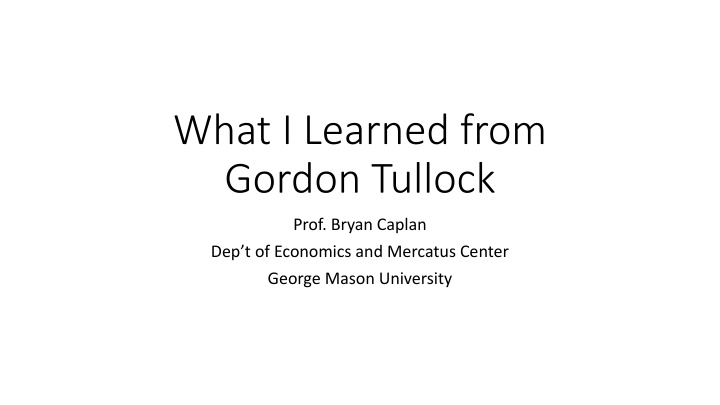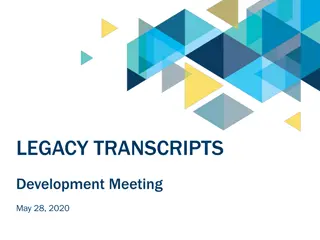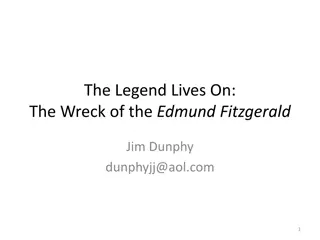Lessons from Gordon Tullock: A Legacy of Iconoclasm
Gordon Tullock, an influential economist at George Mason University, challenged conventional wisdom by applying economic principles to politics. He viewed politics as a ruthless game of self-interest, analyzing dictatorships and revolutions with a cynical yet insightful perspective. Tullock's iconoclasm encouraged asking uncomfortable questions, leaving a lasting impact on the field of economics and political science.
Uploaded on Sep 23, 2024 | 0 Views
Download Presentation

Please find below an Image/Link to download the presentation.
The content on the website is provided AS IS for your information and personal use only. It may not be sold, licensed, or shared on other websites without obtaining consent from the author.If you encounter any issues during the download, it is possible that the publisher has removed the file from their server.
You are allowed to download the files provided on this website for personal or commercial use, subject to the condition that they are used lawfully. All files are the property of their respective owners.
The content on the website is provided AS IS for your information and personal use only. It may not be sold, licensed, or shared on other websites without obtaining consent from the author.
E N D
Presentation Transcript
What I Learned from Gordon Tullock Prof. Bryan Caplan Dep t of Economics and Mercatus Center George Mason University
My Time With Tullock I met Gordon Tullock in the summer of 1993, soon after reading The Calculus of Consent in college. I joined the GMU econ faculty in 1997. Two years later, Gordon returned to GMU. I regularly saw and lunched with Gordon until his retirement. Still, it s hard for me to separate the man from his ideas, because Tullock s ideas infused his whole existence. Highlights
Political Man Tullock wasn t just one of the first social scientists to use economics to understand politics. He remains one of the most thoughtful. Unlike Buchanan, Tullock didn t see politics as an exchange. Instead, he saw self-interested actors playing a brutal game of finders keepers. This is especially clear in Tullock s work on dictatorship. Dictators aren t just milking their subjects for all they re worth. They re also desperately trying to stay alive. Yet Tullock was quick to acknowledge anomalies and fit them into his broader framework. The charity of the uncharitable. The evolution of constitutional monarchy in 19th-century Europe.
Ultra-Cynicism Tullock was proudly cynical. This let him see ugly truths most social scientists prefer to ignore. The paradox of revolution: Contrary to almost every historical narrative, the mass of men are politically apathetic. The nature of revolution: Winners overcome this silent apathy by any means necessary. This is never pretty at the time, and normally ends in disaster. The good news: Political apathy spares mankind the horrors of successful revolution.
Iconoclasm Tullock s deepest lesson, though, is: Ask awkward questions. Two random examples: What s so bad about dictatorship? Give me one good reason not to invade Brazil. Technically, many economists had the skills to do what Gordon did. But very few tried to compete with him. Why? Because Gordon wasn t afraid to offend. Many people have told me that Gordon s iconoclasm cost him a Nobel Prize. To me, this misses the real point: Gordon deserved a Nobel Prize because of his iconoclasm.























